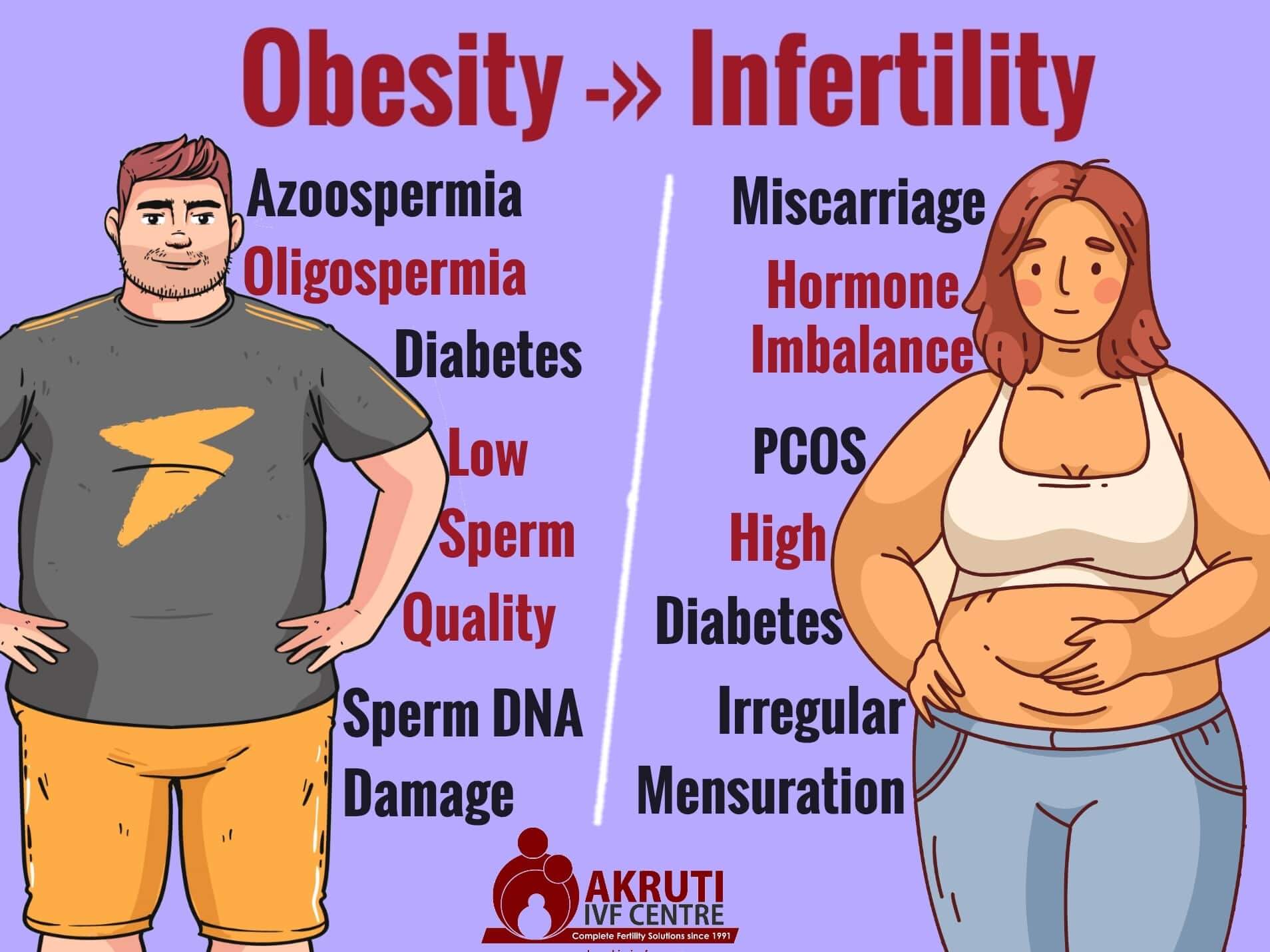
Obesity & Infertility
What is Obesity?
The unnecessary or abnormal build-up of body fat making the person more likely to develop Type-2 diabetes and other heart related diseases; obesity is complex chronic disorder affecting “1 in 8 person” in the world.
What are the factors causing obesity?
- Genetic factors
- No exercise, Inactive & sedentary lifestyle.
- Stress at work or general life.
- Unhealthy, Irregular / untimely eating & overeating habits.
- Poor or Improper diet lacking nutrition & high on carbohydrates & fats.
- Lack of good quality sleep.
- Bad habits like drinking & smoking.
How do I know that I have obesity or I am obese?
Obesity is measured by BMI (Body Mass Index) which is calculated by dividing a person’s weight in Kg by person’s height² (square) in meters i.e. BMI = weight / (height) ².
| BMI chart for Weight calcification status | |
| Weight status | BMI(Body Mass Index) – Kg / m² |
| Underweight | <18.5 |
| Normal weight | 18.5 – 24.9 |
| Overweight | 25.0 – 29.9 |
| Obese | ≥30.0 |
Note – BMI does not consider muscle mass or fat distribution thus is not the most accurate indicator.
What health problem or issues will affect an obese person?
Obesity can lead to various health issues & problems like
- Infertility issues (male & Female)
- Cardiovascular diseases such as heart disease and stroke
- Type 2 diabetes
- High blood pressure
- Joint problems such as osteoarthritis
- Sleep apnea
- Respiratory issues
- Certain cancers
- Psychological issues such as depression and low self-esteem
How does obesity affect fertility?
- Obesity disrupts hormonal balance in both men and women, affecting ovulation and menstrual regularity.
- Obese women experience irregular menstrual cycles and ovulatory dysfunction, reducing their chances of pregnancy. Obesity is strongly associated with Polycystic Ovary Syndrome (PCOS), a hormonal disorder characterized by enlarged ovaries.
- In men, obesity leads to reduced sperm quality, impairing fertility.
- Obesity increases the risk of pregnancy complications like gestational diabetes, preeclampsia, miscarriage, and stillbirth.
- Obese individuals may also experience lower success rates with assisted reproductive technologies, affecting the response to fertility medications and embryo quality.
How does obesity affect fertility treatments such as IVF?
- Obese women undergoing IVF have lower success rates due to factors such as lower embryo implantation, higher miscarriage rates, and live birth rates.
- Obesity affects the body’s response to fertility medications, resulting in higher doses and increased risk of ovarian hyperstimulation syndrome.
- Obesity also affects egg quality and embryo quality, impairing uterine receptivity.
- Obese women are at higher risk of pregnancy complications, surgical challenges, and male fertility. Addressing obesity in male partners may improve overall fertility outcomes in couples with male factor infertility
Does fertility improve after weight loss in obese individuals?
Yes weight loss can improve the fertility and significantly increase the chances of getting pregnancy; weight loss helps increase the pregnancy chances by 5%;
- Response to fertility medications for male & female
- Reduce pregnancy complication for female
- Improve male fertility by normalizing hormones levels
- Improve male sperm quality & parameters.
What is the impact of obesity (High BMI) on female fertility?
- Obesity affects the HPG axis by increased free estrogen levels due to increased conversion of androgens to estrogens in adipose tissue.
- Increase estrogen causes a decrease in GnRH by negative feedback.
- Reduced gonadotropin levels leading to menstrual disorders and anovulation.
- Have difficulties in both assisted and natural conception, rise in miscarriage rates and pregnancy complications.
- High levels of adipose tissue in women exacerbates PCOS due to increased levels of harmful adipokines (leptin) and decreased levels of beneficial adipokines ( adiponectin).
- Excess weight, particularly excess abdominal fat, is linked to insulin resistance (when the body has to produce more insulin to keep blood sugar levels normal) and decreased levels of sex hormone-binding globulin (SHBG), a protein that is involved in the regulation of the sex-hormones testosterone and estrogen.
What is the impact of Obesity (high BMI) on male fertility?
- Males with an elevated BMI have been confirmed to have a greater chance of altered sperm parameters and reduced fertility.
- Weight loss of these men significantly increased total sperm count and percentage of sperm with normal morphology.
- Oligospermia and azoospermia have been observed in obese males.
- The combination of insulin resistance and increased peripheral conversion of androgens to estrogens (hyperestrogenemia) disrupts hypothalamic signaling.
- Elevated estrogens in obese men may, in part, result from the increased mass of white adipose tissue.
- Increased male BMI is associated with reduced plasma concentrations of sex hormone binding globulin (SHBG) and testosterone.
- The odds of infertility increase by 10% for every 9 kg (20 pounds) a man is overweight.
What is the impact of obesity during conception for female?
- Increased chances of early miscarriage & recurrent abortions.
- Increased chances of preterm or premature baby birthing.
- Increased chances of still (baby not alive) born baby.
- Increased operative morbidity of mother during C-section (caesarean) delivery.

